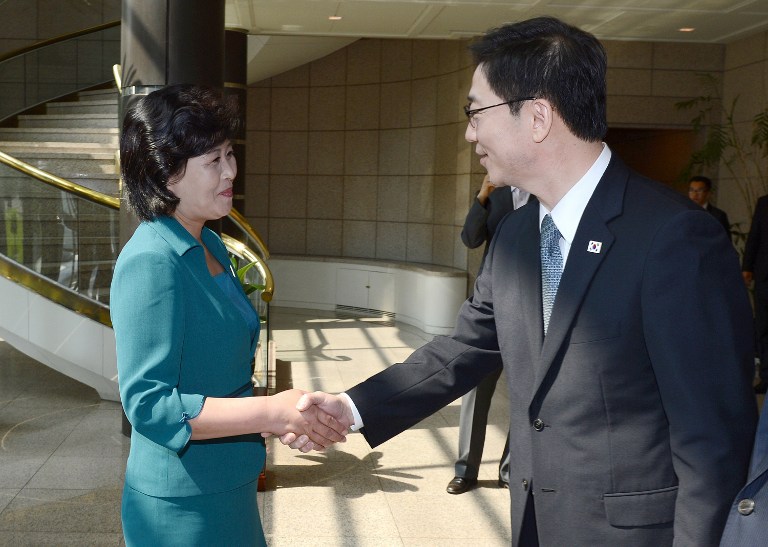SUMMARY
This is AI generated summarization, which may have errors. For context, always refer to the full article.

SEOUL, South Korea (3rd UPDATE) – North and South Korea held their first official talks for more than two years Sunday, June 9, seeking to set up a high-level meeting in Seoul after months of tensions and threats of nuclear war.
The working-level discussions – weighed down, as always, by decades of mutual distrust – were held in the border truce village of Panmunjom where the armistice ending the 1950-53 Korean War was signed.
“The overall atmosphere was… calm and the discussion proceeded with no major debate,” the South’s Unification Ministry spokesman Kim Hyung-Seok said after the morning session between the two delegations, each comprising three representatives.
The talks moved into a fourth session in the evening as the two sides sought to agree a framework for what would be their first ministerial-level meeting since 2007 – tentatively scheduled in Seoul on Wednesday, June 12.
The agenda will focus on restoring suspended commercial links, including the Kaesong joint industrial complex that the North effectively shut down in April as tensions between the historic rivals peaked.
“Today’s talks were purely preparatory, so there was little room for dispute,” said Yang Moo-Jin, a professor at the University of North Korean Studies in Seoul.
“We’ll get a better sense of where things really stand on Wednesday,” Yang told AFP.
Sunday’s talks came about after an unexpected reversal on Thursday, June 6, from North Korea, which suddenly dropped its default tone of high-decibel belligerence and proposed opening a dialogue.
South Korea responded swiftly with its offer of a ministerial meeting in Seoul, the North countered with a request for lower-level talks first and — after some relatively benign to-and-fro about the best venue — Sunday’s meet in Panmunjom was agreed.
In a further signal of intent, North Korea on Friday, June 7, restored its official hotline with the South, which it had severed in March.
The move towards dialogue has been broadly welcomed – given the threats of nuclear war that were being flung around in April and May – but there is sizeable skepticism about Pyongyang’s intentions.
“The North Korean offer has all of the hallmarks of Pyongyang’s diplomacy,” said Stephan Haggard, a North Korea expert at the Peterson Institute for International Economics.
“Pyongyang is ‘sincerely’ and ‘magnanimously’ inviting the South to fix, and pay for, problems of the North’s own creation,” Haggard said.
It was the North’s decision to withdraw its 53,000 workers in early April that closed Kaesong.
The North also wants to discuss resuming tours by South Koreans to its Mount Kumgang resort. These were suspended after a North Korean soldier shot dead a South Korean tourist there in July 2008.
Kaesong and Mount Kumgang were both significant sources of scarce foreign currency for North Korea, which is squeezed by UN sanctions imposed over its nuclear weapons programme.
There are also suggestions that Pyongyang was playing to a specific audience by proposing talks just before US President Barack Obama and Chinese President Xi Jinping sat down for their crucial summit in California.
China, the North’s sole major ally and economic benefactor, has been under US pressure to restrain its neighbour and has pushed Pyongyang to drop its destabilising strategy of confrontation.
On Saturday, June 8, Obama and Xi closely consulted on North Korea’s recent nuclear brinkmanship, and agreed to work together on the “denuclearization” of the Korean peninsula, US National Security Advisor Tom Donilon said.
Analysts say South Korea will approach talks with Pyongyang with a caution born of long experience.
President Park Geun-Hye, who took office in February with a promise of greater engagement with Pyongyang, has welcomed the initiative.
But she remains adamant that any substantive dialogue can only take place if the North shows some tangible commitment to abandoning its nuclear weapons programme.
North Korea has been equally emphatic in declaring its nuclear deterrent is not up for negotiation.
It was the North’s nuclear test in February – and subsequent UN sanctions – that triggered the recent crisis, which saw Pyongyang threaten both the South and the United States with pre-emptive nuclear strikes. – Rappler.com
Add a comment
How does this make you feel?
There are no comments yet. Add your comment to start the conversation.